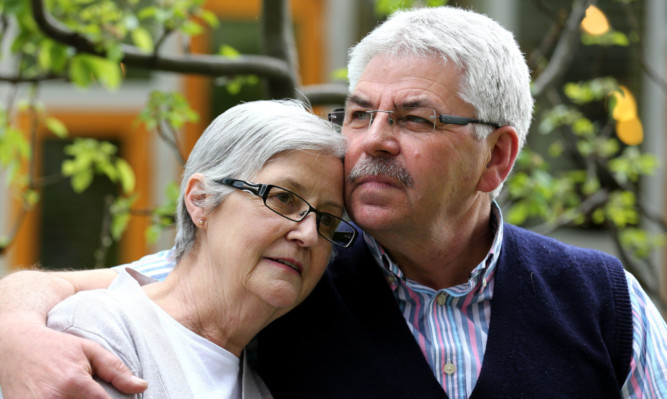A grandmother of 10 said she has explored moving to England as a “health refugee” to get cancer treatment needed to extend her life.
The case of retired secretary Maureen Fleming, 63, who suffers from bowel cancer, was raised by Labour leader Johann Lamont during First Minister’s Questions.
Speaking after the clash between Holyrood leaders, which she watched from the public gallery with her husband Ian, 65, Mrs Fleming said the couple were considering a temporary move to England for six months’ treatment as it would be cheaper than three months’ treatment in Scotland.
According to Mr Fleming, the couple could shift south from their Dunbartonshire home within weeks after being confronted with a medical bill in excess of £10,000 to receive the drug through their local NHS board.
Mrs Fleming, who was employed for a spell at the Vale of Leven Hospital, said of her battle for treatment in Scotland: “It’s stressful. When you feel least ready for the fight, that’s when it’s coming towards you. It’s like a train coming towards you and you think ‘what do I do now?’”
Former shipyard worker Mr Fleming added: “We think it’s very unfair that we have to move. We have got families and it would involve a wee bit of upheaval because we do the nursery runs and the school pick-ups so our children can work.”
The NHS spends £7.2 million a year just on prescriptions for paracetamol, cash which can be used to give 200 patients a year’s supply of bowel cancer drug cetuximab, Ms Lamont had earlier told First Minister Alex Salmond.
While cetuximab recommended to Mrs Fleming by her consultant is free in England, cancer patients here have to pay about £3,000 a month for it, the Labour leader said, while claiming that Scotland is in “danger of exporting health refugees”.
She said the case of Mrs Fleming “represents a failure within the system” and called on the Scottish Government to “address what is happening to families now who do not have time to wait”.
Ms Lamont added: “Scots cancer patients are three times less likely to get the drugs they need on the Scottish NHS than patients in England, according to cancer charities.
“Scottish cancer patients have to pay thousands of pounds for vital, life-enhancing drugs which are available free south of the border. That means some Scottish cancer victims are planning to uproot their families from their homes and communities to move to England for treatment they can’t afford here.”
On the issue of cetuximab, Mr Salmond said it had been approved for use on the NHS by the Scottish Medicines Consortium (SMC) but added that the “decision to restrict its use” was made as a result of an application by the drugs company.
While he said there was a cancer drugs fund in England, he said under the terms of that cetuximab was only available for specific conditions with restrictions on use.
Mr Salmond said: “We also know the cancer drugs fund is coming to an end next year in England and has been in recent weeks heavily restricted.
“We also know it has been heavily criticised, including by cancer charities, who challenged the idea of the cancer drugs fund.”
He said Scotland had an “efficient process” for approving drugs for the NHS, saying the SMC was “widely admired” but added improvements could be made, which was why a recent review was carried out.
